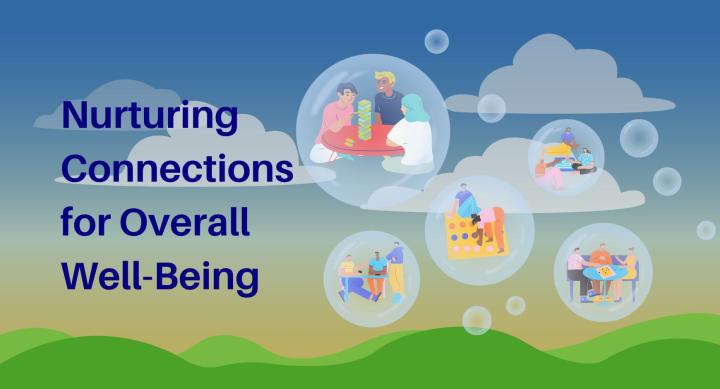
July marks Social Wellness Month, a time dedicated to highlighting the importance of cultivating healthy social connections for our overall well-being. While individual wellness encompasses physical, mental, and emotional health, social wellness focuses on the quality and depth of our relationships. We find support, belonging, and fulfillment through our social interactions. In this blog post, we will delineate the difference between wellness and well-being and explore the significance of social wellness and how it contributes to our overall well-being.
Wellness refers to the state of being in good physical and mental health, achieved through proactive measures such as exercise, healthy eating, and stress management. Wellness is often focused on the individual and their lifestyle choices, with the goal of preventing illness and maintaining optimal health.
Well-being, on the other hand, is a broader concept that encompasses physical and social, emotional, and spiritual health. It is the experience of feeling fulfilled, satisfied, and content with one's life, regardless of external circumstances. Well-being is influenced by many factors, including personal relationships, social support, community engagement, and a sense of purpose or meaning in life.
The Impact of Well-Being:
Numerous studies have demonstrated the profound impact of social connections on our well-being. Maintaining healthy relationships can enhance our mental and emotional health, decrease stress levels, and improve overall life satisfaction. A study published in the Journal of Health and Social Behavior found that individuals with strong social support networks have a higher likelihood of experiencing better health outcomes and a lower risk of developing mental health disorders.
The Connection Between Social Wellness and Well-Being:
Social wellness extends beyond the quantity of relationships we have; it encompasses the quality and depth of those connections. Meaningful relationships provide emotional support, a sense of belonging, and a space for personal growth. By nurturing social wellness, we can enhance our overall well-being in the following ways:
Emotional Support: Social connections offer a support system during challenging times, providing a safe space to express emotions, seek guidance, and receive empathy. Trusted friends, family, or even support groups can help us navigate life's ups and downs, promoting emotional resilience.
Reduced Stress and Improved Mental Health: Engaging in positive social interactions has been shown to reduce stress levels and lower the risk of depression and anxiety. Sharing laughter, engaging in hobbies together, and participating in social activities promote a sense of joy and improve mental health.
Enhanced Self-Esteem: Healthy relationships foster a sense of belonging and acceptance, which positively impacts our self-esteem. Being surrounded by people who appreciate and value us for who we are can boost self-confidence and self-worth.
Personal Growth and Learning: Meaningful connections provide opportunities for personal growth and learning. Engaging with diverse perspectives, exchanging ideas, and receiving constructive feedback from trusted individuals can broaden our horizons and help us develop new skills and knowledge.
As we celebrate Social Wellness Month, let us recognize the immense impact social connections have on our overall wellness and well-being. By fostering strong relationships, actively engaging in social activities, and prioritizing meaningful connections, we can enhance our emotional, mental, and physical health. So, let's celebrate this month by reaching out to loved ones, engaging in social activities, and investing in our social connections to truly thrive in all aspects of our lives.
Social Wellness Toolkit: https://www.nih.gov/health-information/social-wellness-toolkit
The Well-Being Wheel: https://www.unh.edu/health/wellbeing-wheel
Global Wellness Institue: https://globalwellnessinstitute.org/what-is-wellness/
References:
Global Wellness Institute. (n.d.). What is Wellness? Retrieved from https://globalwellnessinstitute.org/what-is-wellness/
Naslund, J.A., Bondre, A., Torous, J. et al. Social Media and Mental Health: Benefits, Risks, and Opportunities for Research and Practice. J. technol. behav. sci. 5, 245–257 (2020). https://doi.org/10.1007/s41347-020-00134-x
Umberson, D., Montez, J. K., & Brown, D. (2010). Social relationships and health: A flashpoint for health policy. Journal of Health and Social Behavior, 51(Suppl), S54-S66.
University of New Hampshire. (n.d.). Well-being Wheel. Retrieved from https://www.unh.edu/health/wellbeing-wheel
